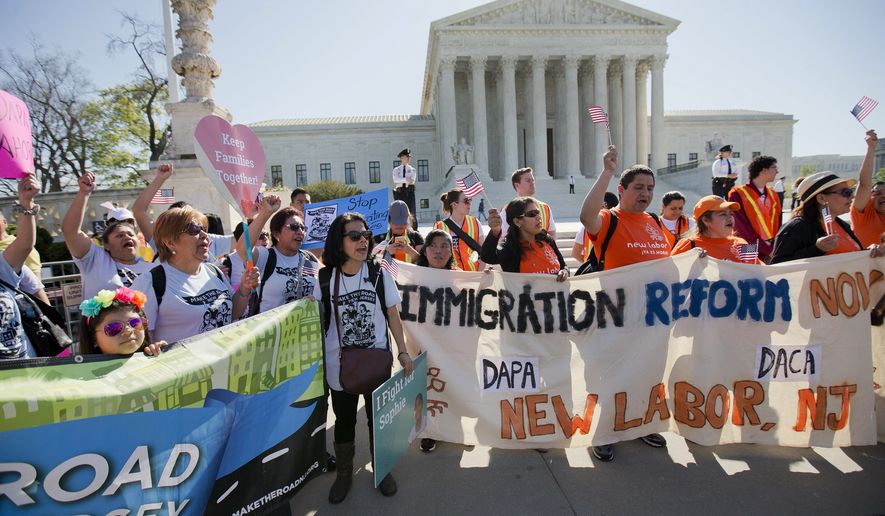A deeply divided Supreme Court grappled Monday with President Obama’s deportation amnesty, as conservatives said the White House was encroaching on Congress’ lawmaking powers, but liberal justices saying the court should stay out of the fight, leaving the president with a free hand.
Outside the courthouse, thousands of Hispanic rights activists rallied, shouting slogans in Spanish and English as they demanded leniency from the justices. The activists also vowed political retribution on Congress, particularly on Republicans, if Mr. Obama loses the case.
Things were much more sedate inside the courtroom, where attorneys sparred with the justices over the intricacies of immigration law and what Congress intended when it said illegal immigrants should be deported — but gave the president only enough money to kick out a small fraction.
Texas and 25 other states said it’s time for the high court to get involved, and they appeared to have allies among the four Republican-appointed justices, who questioned where Mr. Obama derived the power to grant tentative legal status.
“It’s as if the president is setting the policy and the Congress is executing it. That’s just upside down,” said Justice Anthony M. Kennedy, who is expected to be an important voice as the court decides what to do.
At issue is a set of policies Mr. Obama and Homeland Security Secretary Jeh Johnson announced in November 2014.
SEE ALSO: Chief Justice Roberts uses Obama’s words against him on immigration case
One of those policies set deportation priorities that carved most illegal immigrants out of any danger of deportation — that is not being challenged.
But yet another policy granted as many as 5 million illegal immigrants with children who have legal status in the U.S. a three-year stay of deportation, accompanied by work permits, entitling them to driver’s licenses and some taxpayer benefits, including Social Security.
Mr. Obama said since he’s not going to deport them anyway, it makes sense to let them into the legal economy, where they will earn better wages and help the economy overall, and the four Democrat-appointed justices seemed to agree.
“They are here whether we want them or not,” said Justice Sonia Sotomayor, the only Hispanic member of the court.
She said what Mr. Obama did appears to be in line with actions of previous presidents, who deferred deportations and offered work permits to illegal immigrants caught in a legal limbo in the 1980s and 1990s.
With eight justices on the bench after the death of Justice Antonin Scalia, a 4-4 split is possible.
SEE ALSO: Obama amnesty Supreme Court case to test limits of presidential power
That would leave in place the ruling of the lower appeals court, which decided 2-1 that Mr. Obama’s amnesty violated immigration law.
A tie decision would also leave for future courts the biggest questions over the extent of presidential powers — limits that Mr. Obama has repeatedly tested.
Indeed, for nearly six years of his tenure, Mr. Obama himself said he didn’t have power to impose such a broad amnesty — then reversed himself after the 2014 congressional elections.
In oral argument Monday, Chief Justice John G. Roberts Jr. read out a quote from one of more than a dozen times Mr. Obama said he didn’t have such expansive powers. “What was he talking about?” the chief justice prodded Solicitor General Donald B. Verrilli Jr., Mr. Obama’s liaison to the high court.
Mr. Verrilli said Mr. Obama must have changed his mind after asking the Justice Department’s legal advisory branch to take a closer look.
Mr. Obama’s amnesty has proved controversial among voters overall but is very popular with Hispanics, who are a growing power in elections.
Hispanic leaders have vowed to rally their community to punish Republicans for their strict stance on illegal immigration, and they made that clear at rallies in front of the Supreme Court on Monday.
The case, United States v. Texas, has drawn intense interest from Congress, where Democrats and Republicans filed opposing briefs, and from activists on issues ranging from presidential power to immigration law to business interests.
“This has tremendous political valence,” Justice Stephen G. Breyer said.
But the possibility of a 4-4 tie could sap much of the energy from the case, since it would mean the court would not issue a definitive opinion on the limits of presidential power.
The court had asked all sides to submit briefs on whether Mr. Obama was violating the Constitution’s admonition that the president “take care” that the laws are faithfully executed, but there was no discussion of that during oral argument.
The liberal justices questioned whether Texas even had standing to sue in the first place, doubting the state’s worry that it will face a flood of new illegal immigrants and will have to subsidize driver’s licenses and pay for other benefits for the folks who qualify for Mr. Obama’s policy.
Justice Sotomayor said that if Texas could sue to stop immigration policy like this, it would open the door for states to sue any time they find fault with a federal policy, making judges the referees in myriad disputes.
“That really pits the states against every federal agency,” she said.
• Stephen Dinan can be reached at sdinan@washingtontimes.com.




Please read our comment policy before commenting.